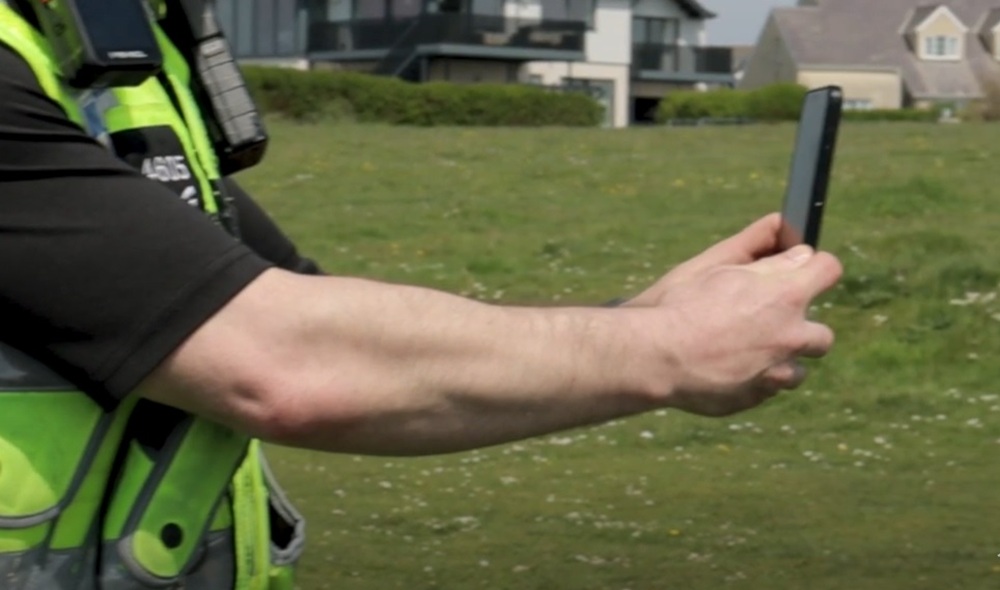Police forces in Wales launch first facial recognition mobile app

Police officers in south Wales and Gwent are being issued with a new mobile phone app which allows them to confirm the identity of an individual at the touch of a button.
The two forces will become the first in the UK to be able to access controversial facial recognition technology via an app.
The app can be used by officers to confirm the identity of a missing person, someone who is missing, at risk or wanted in circumstances when they’re unable or unwilling to confirm their identity or provide false details.
The app can also be used on someone who has passed away or are unconscious – helping officers to identify them promptly.
Tested
The Operator Initiated Facial Recognition (OIFR) app has already been tested by 70 officers across south Wales who were able to use it where people either refused to identify themselves or provided false details.
The forces say that photographs taken using the app are never retained and in private places such as houses, schools, medical facilities and places of worship the app will only be used in situations relating to a risk of significant harm.
Temporary Assistant Chief Constable Trudi Meyrick of South Wales Police said: “Police officers have always been able to spot someone who they think is missing or wanted and stop them in the street. What this technology does is enhance their ability to accurately confirm a person’s identity, helping to ensure a fair and transparent resolution.
“This mobile phone app means that with the taking of a single photograph which is compared to the police database, officers can easily and quickly answer the question of ‘Are you really the person we are looking for?’. When dealing with a person of interest during their patrols in our communities, officers will be able to access instant information allowing them to identify whether the person stopped is, or isn’t, the person they need to speak to, without having to return to a police station.
“This technology doesn’t replace traditional means of identifying people and our police officers will only be using it in instances where it is both necessary and proportionate to do so, with the aim of keeping that particular individual, or the wider public, safe.”
Concerns
However, civil rights group Big Brother Watch has raised concerns that the mobile facial recognition app could create a “dangerous imbalance” between the public’s rights and the police’s powers.
Rights groups have complained that the police are storing images of innocent people in its national database which may be used for facial recognition checks.
This is despite a high court ruling in 2012 that keeping custody images of individuals who were not charged or were charged then acquitted is unlawful.
Jake Hurfurt, head of Research and Investigations at Big Brother Watch said: “South Wales Police will search against thousands of unlawfully held photos every time they do a face scan, and they should be fixing this ongoing industrial-scale privacy breach rather than exploiting these photos for yet more surveillance.”
South Wales Police has also previously been accused by the group of disproportionately targeting ethnic minorities for face scans.
Annual report
According to the latest annual report of the biometrics and surveillance camera commissioner, which covers the 12 months from April 2023 to March 2024, “forces continue to retain and use images of people who, while having been arrested, have never subsequently been charged or summonsed”.
The previous biometrics commissioner estimated in February last year that “there are probably several million” unlawfully held custody images in Police National Database.
T/Assistant Chief Constable Nick McLain of Gwent Police said: “Embracing technology and innovation is an integral part of effective policing and public safety. I am proud that Gwent and South Wales Police are jointly leading the way in this field with the introduction of the first facial recognition app.
“The use of this technology always involves human decision-making and oversight, ensuring that it is used lawfully, ethically, and in the public interest. We have a robust scrutiny process in place to ensure accountability and testing found no evidence of racial, age or gender bias.
“By implementing this app, we are preventing harm, helping those in need and keeping our communities safe.”
Support our Nation today
For the price of a cup of coffee a month you can help us create an independent, not-for-profit, national news service for the people of Wales, by the people of Wales.





The College of Policing is a law unto itself it has been told by successive home secretaries and the court of appeal to stop misusing non-crime hate incidents but they’re still doing it. You can be sure this new technology will be used unlawfully.
As a former Police & Crime Commissioner I am with Big Brother Watch on this. Use of facial recognition technology is disproportionate in its use and has few privacy safeguards and it is not underpinned by legislation.
Does facial recognition work to identify the many drug delivery boys wearing balaclavas or people wearing any other sort of face covering?
“The app can be used by officers to confirm the identity of a missing person, someone who is missing, at risk or wanted in circumstances when they’re unable or unwilling to confirm their identity or provide false details.”
And where have the police obtained the initial data to be able to confirm or disprove a person’s identity?
There must be widespread covert surveillance and data collection of everyone going on.